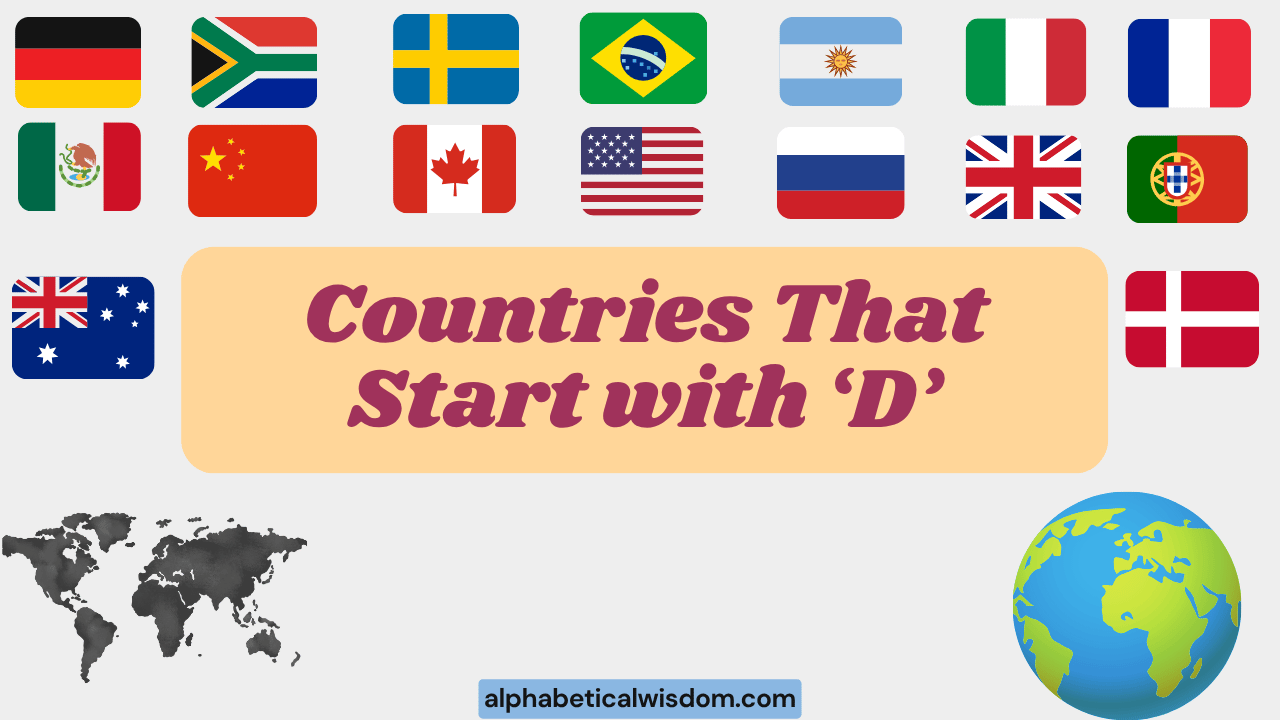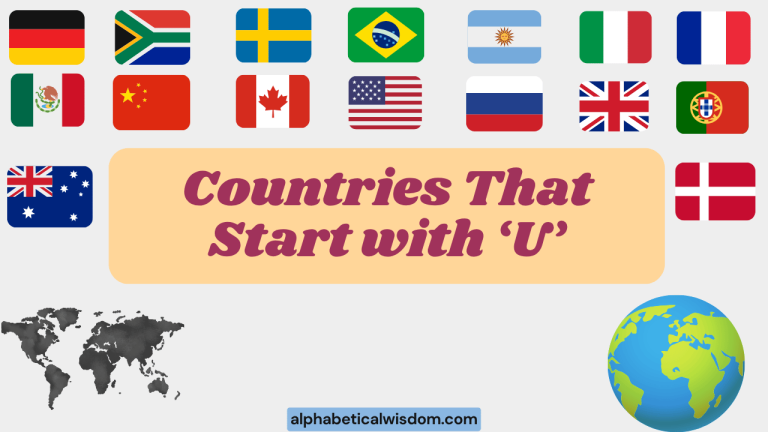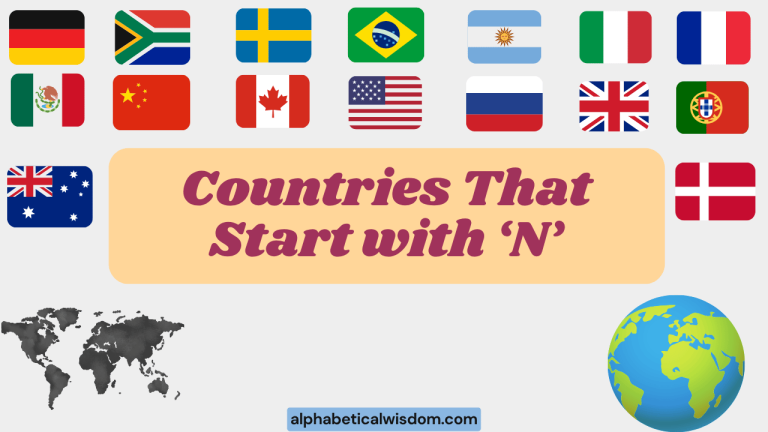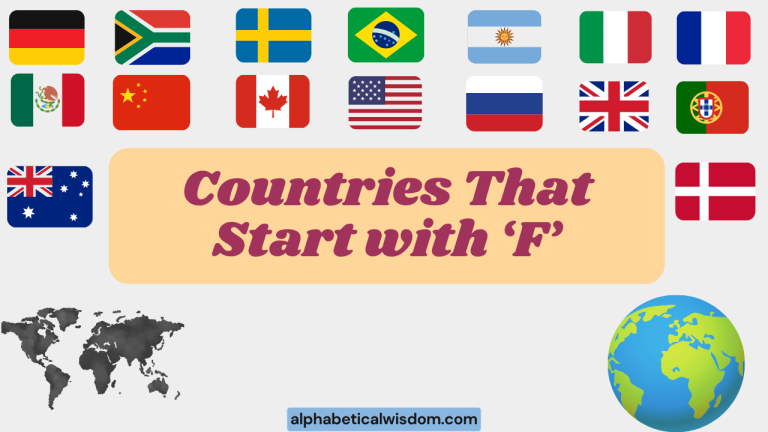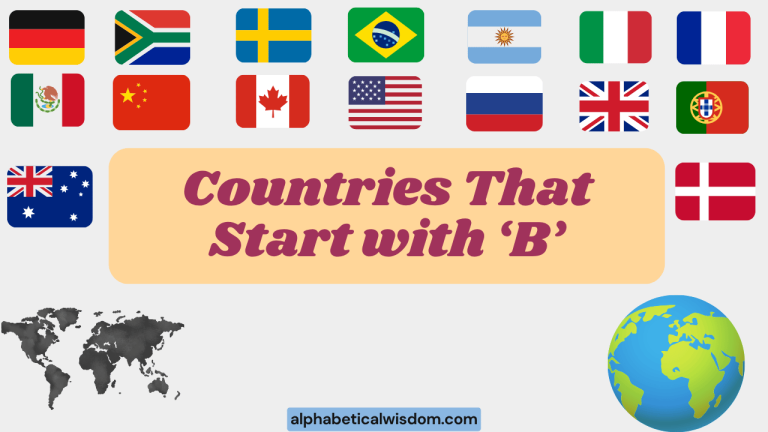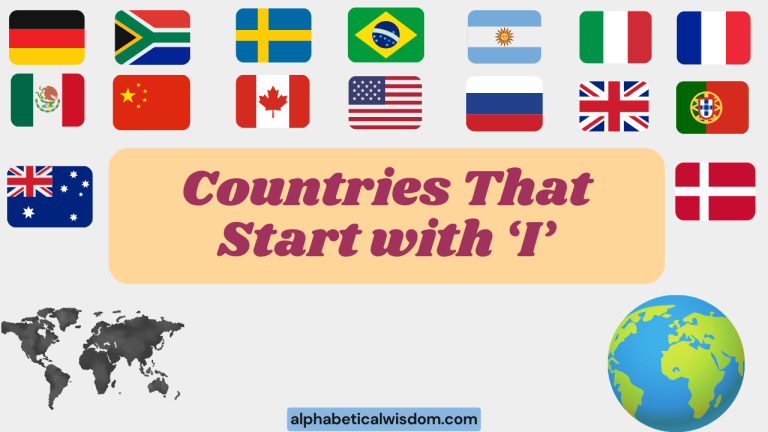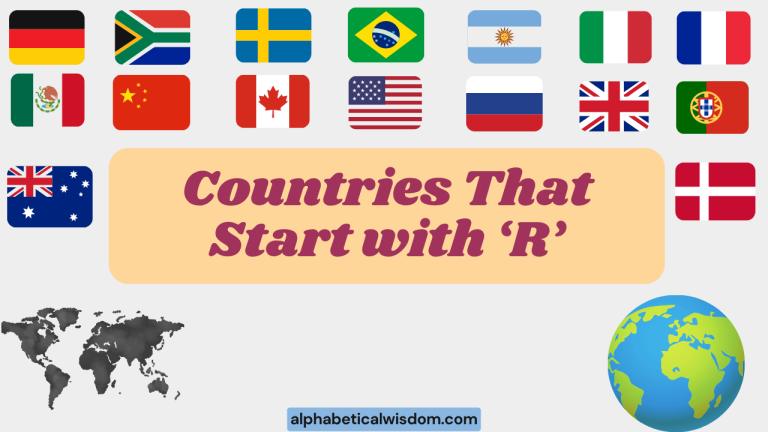Countries Starting With D: A Grammar & Usage Guide
Understanding how to correctly use country names, especially those starting with the letter “D,” involves several aspects of English grammar. This includes proper capitalization, article usage, and the correct forms of adjectives and nouns derived from these names.
Mastering these rules is essential for clear and accurate communication, whether in academic writing, professional contexts, or everyday conversation. This guide is designed to help learners of all levels, from beginners to advanced speakers, navigate the nuances of using countries starting with “D” in grammatically correct sentences.
By exploring definitions, structural patterns, usage rules, and common mistakes, this article aims to provide a comprehensive understanding of this specific area of English grammar and improve overall language proficiency.
Table of Contents
- Introduction
- Definition: Countries Starting With “D”
- Structural Breakdown
- Types and Categories
- Examples
- Usage Rules
- Common Mistakes
- Practice Exercises
- Advanced Topics
- FAQ
- Conclusion
Definition: Countries Starting With “D”
The term “countries starting with D” refers to a specific subset of countries whose names begin with the letter “D” in the English language. These countries, like all others, are proper nouns and thus require capitalization. Understanding their grammatical behavior is crucial for constructing accurate and meaningful sentences. This involves knowing their adjectival forms (e.g., Dutch from the Netherlands, often mistakenly associated with “D” countries), noun forms (e.g., Dane from Denmark), and how to use them in various contexts. The function of these names is primarily to denote a specific geographic and political entity, and they can serve as subjects, objects, or modifiers within a sentence.
The context in which these country names are used can vary widely, ranging from formal academic writing to informal conversations. In formal writing, precision and adherence to grammatical rules are paramount.
In informal settings, while some grammatical liberties may be taken, a basic understanding of the rules is still necessary for clear communication. Furthermore, cultural sensitivity is essential when discussing different countries, and using the correct name and associated terms demonstrates respect and awareness.
Structural Breakdown
The structural breakdown of sentences involving countries starting with “D” involves several key elements. First and foremost, the country name itself functions as a proper noun and must be capitalized. For example, “Denmark” and “Dominica” always begin with a capital letter. The presence of articles (the, a, an) before the country name depends on the specific country and context. For instance, we say “the Dominican Republic” but simply “Denmark.”
Adjectives derived from these country names often modify other nouns, providing information about origin, nationality, or association. For example, “Danish” modifies “pastries” in the phrase “Danish pastries.” The placement of these adjectives is typically before the noun they modify, following standard English word order.
Noun forms, representing people from these countries, also play a role. A person from Denmark is a “Dane,” and this noun form can be used as the subject or object of a sentence.
Understanding these structural elements is crucial for constructing grammatically sound and meaningful sentences.
Furthermore, the verb agreement must align with the subject, which could be the country name itself or a noun referring to its people. For example, “Denmark is a Scandinavian country” requires a singular verb (“is”), while “Danes are known for their pastries” requires a plural verb (“are”). The correct use of prepositions (in, to, from) is also important when indicating location or movement related to these countries. For example, “I am traveling to Dominica” or “She is from Denmark.”
Types and Categories
Countries starting with the letter “D” can be categorized based on various factors, including their geographic location, political system, and economic status. One common categorization is by continent.
For example, Denmark is located in Europe, while Dominica and the Dominican Republic are in the Americas (specifically, the Caribbean). Another categorization is by political system, such as monarchy (Denmark) or republic (Dominican Republic).
These classifications provide a broader context for understanding the countries and their respective cultures.
Another important distinction lies in their official language(s). While English is widely spoken in Dominica, Danish is the official language of Denmark, and Spanish is the official language of the Dominican Republic.
This linguistic diversity influences the cultural landscape and can impact communication and interactions. Furthermore, the economic status of these countries varies, with Denmark being a developed nation and Dominica and the Dominican Republic being developing nations.
These economic differences shape their social structures and opportunities.
Finally, it’s useful to categorize countries based on their historical background. Denmark has a long and rich history as a Scandinavian kingdom, while Dominica and the Dominican Republic have colonial histories that have shaped their identities.
Understanding these historical contexts is essential for appreciating the nuances of their cultures and societies. These categorizations, while not exhaustive, provide a framework for understanding the diverse nature of countries starting with the letter “D.”
Examples
General Usage
This section provides examples of how countries starting with “D” are generally used in sentences. These examples showcase the correct capitalization and basic sentence structure.
| Example | Category |
|---|---|
| Denmark is a Scandinavian country. | Statement of Fact |
| I plan to visit Dominica next year. | Future Plan |
| The Dominican Republic is known for its beaches. | Description |
| Denmark’s economy is quite strong. | Possession |
| The capital of Dominica is Roseau. | Statement of Fact |
| Many tourists visit the Dominican Republic each year. | General Truth |
| Denmark is famous for its design and architecture. | Description |
| Dominica offers beautiful hiking trails. | Description |
| The Dominican Republic’s culture is vibrant and diverse. | Description |
| Denmark has a high standard of living. | Statement of Fact |
| Dominica is an island nation. | Statement of Fact |
| The Dominican Republic exports sugar and coffee. | Economic Activity |
| Denmark is a member of the European Union. | Political Affiliation |
| Dominica is part of the Lesser Antilles. | Geographic Location |
| The Dominican Republic shares an island with Haiti. | Geographic Fact |
| Denmark’s flag is red and white. | Description |
| Dominica’s rainforests are lush and green. | Description |
| The Dominican Republic’s music is influenced by African rhythms. | Cultural Influence |
| Denmark is a popular destination for cyclists. | Travel Information |
| Dominica is known as the “Nature Island.” | Nickname |
| The Dominican Republic celebrates its independence on February 27th. | Cultural Event |
| Denmark has a long history of seafaring. | Historical Fact |
| Dominica’s economy relies on agriculture and tourism. | Economic Activity |
| The Dominican Republic’s baseball players are famous worldwide. | Cultural Achievement |
| Denmark’s social welfare system is highly regarded. | Social System |
| Dominica’s landscape is volcanic in origin. | Geological Fact |
| The Dominican Republic’s cuisine is rich in flavor. | Cultural Fact |
Adjective Forms
This section illustrates how to use adjectives derived from countries starting with “D.” Note the correct forms and their usage in modifying nouns.
| Example | Country |
|---|---|
| Danish pastries are delicious. | Denmark |
| Dominican coffee has a rich flavor. | Dominican Republic |
| Danish design is known for its simplicity. | Denmark |
| Dominican cigars are highly prized. | Dominican Republic |
| Danish furniture is often minimalist. | Denmark |
| Dominican music fills the streets. | Dominican Republic |
| Danish culture values hygge. | Denmark |
| Dominican beaches attract many tourists. | Dominican Republic |
| Danish architecture is modern and functional. | Denmark |
| Dominican food is a mix of Spanish and African influences. | Dominican Republic |
| Danish schools emphasize creativity. | Denmark |
| Dominican artists showcase vibrant colors. | Dominican Republic |
| Danish engineering is world-renowned. | Denmark |
| Dominican hospitality is warm and welcoming. | Dominican Republic |
| Danish films often explore social themes. | Denmark |
| Dominican baseball players excel in MLB. | Dominican Republic |
| Danish healthcare is free for citizens. | Denmark |
| Dominican rum is a popular export. | Dominican Republic |
| Danish traditions are still celebrated today. | Denmark |
| Dominican festivals are lively and colorful. | Dominican Republic |
| Danish weather can be quite cold. | Denmark |
| Dominican nature is lush and diverse. | Dominican Republic |
| Danish history is rich and complex. | Denmark |
| Dominican heritage is a mix of cultures. | Dominican Republic |
| Danish society values equality. | Denmark |
| Dominican society is deeply religious. | Dominican Republic |
Noun Forms
This section provides examples of noun forms referring to people from countries starting with “D.” Note the correct singular and plural forms.
| Example | Country |
|---|---|
| A Dane is a person from Denmark. | Denmark |
| Danes are known for their happiness. | Denmark |
| A Dominican is a person from Dominica or the Dominican Republic. | Dominica/Dominican Republic |
| Dominicans are proud of their heritage. | Dominica/Dominican Republic |
| The Dane spoke fluent English. | Denmark |
| Many Dominicans live abroad. | Dominica/Dominican Republic |
| The Dane enjoyed the local cuisine. | Denmark |
| The Dominican celebrated their victory. | Dominica/Dominican Republic |
| The Dane was surprised by the weather. | Denmark |
| The Dominican shared their culture. | Dominica/Dominican Republic |
| The Dane explained the history. | Denmark |
| The Dominican offered assistance. | Dominica/Dominican Republic |
| The Dane appreciated the art. | Denmark |
| The Dominican danced to the music. | Dominica/Dominican Republic |
| The Dane admired the architecture. | Denmark |
| The Dominican sang a traditional song. | Dominica/Dominican Republic |
| The Dane enjoyed the scenery. | Denmark |
| The Dominican cooked a local dish. | Dominica/Dominican Republic |
| The Dane learned some Danish phrases. | Denmark |
| The Dominican taught some Spanish words. | Dominica/Dominican Republic |
| The Dane explored the city. | Denmark |
| The Dominican hiked in the mountains. | Dominica/Dominican Republic |
| The Dane visited the museum. | Denmark |
| The Dominican relaxed on the beach. | Dominica/Dominican Republic |
Common Phrases
This section provides examples of common phrases using countries starting with “D.” These phrases are frequently used in everyday conversation and writing.
| Example | Context |
|---|---|
| Made in Denmark | Product Origin |
| From the Dominican Republic | Origin/Source |
| Danish design | Style/Aesthetic |
| The Dominican Republic’s beaches | Location/Tourism |
| A trip to Denmark | Travel Plan |
| Living in the Dominican Republic | Residence |
| Inspired by Danish culture | Influence |
| Dominican Republic’s economy | Economic Analysis |
| Studying in Denmark | Education |
| Exploring the Dominican Republic | Tourism |
| Danish architecture | Architectural Style |
| The Dominican Republic’s mountains | Geography |
| Danish cuisine | Food Culture |
| Dominican Republic’s music | Musical Style |
| Danish history | Historical Study |
| Dominican Republic’s art | Artistic Style |
| Danish traditions | Cultural Practices |
| Dominican Republic’s festivals | Cultural Events |
| Danish technology | Technological Advancement |
| Dominican Republic’s agriculture | Economic Sector |
| Danish innovation | Creative Development |
| Dominican Republic’s exports | Trade Products |
| Danish values | Cultural Beliefs |
| Dominican Republic’s heritage | Cultural Legacy |
Complete Sentences
This section provides a variety of complete sentences using countries starting with “D,” showcasing different grammatical structures and contexts.
| Example | Type |
|---|---|
| Denmark is known for its high quality of life. | Statement |
| Have you ever visited Dominica? | Question |
| The Dominican Republic is a popular tourist destination. | Statement |
| She is planning a trip to Denmark next summer. | Statement |
| He comes from the Dominican Republic. | Statement |
| Danish pastries are my favorite treat. | Statement |
| The culture of the Dominican Republic is vibrant and diverse. | Statement |
| Denmark’s economy is one of the strongest in Europe. | Statement |
| Dominica is a beautiful island in the Caribbean. | Statement |
| The Dominican Republic shares the island of Hispaniola with Haiti. | Statement |
| Many people admire Danish design and architecture. | Statement |
| The Dominican Republic is known for its baseball players. | Statement |
| Denmark has a rich history and cultural heritage. | Statement |
| The Dominican Republic celebrates its independence day on February 27th. | Statement |
| Denmark is a member of the European Union. | Statement |
| Dominica’s landscape is dominated by rainforests and mountains. | Statement |
| The Dominican Republic’s capital city is Santo Domingo. | Statement |
| Danish people are known for their friendliness and hospitality. | Statement |
| The Dominican Republic offers a variety of activities, including hiking and snorkeling. | Statement |
| Denmark is a popular destination for cycling enthusiasts. | Statement |
| The Dominican Republic’s cuisine is influenced by Spanish, African, and indigenous traditions. | Statement |
| Denmark’s education system is highly regarded worldwide. | Statement |
| Dominica’s economy relies heavily on tourism and agriculture. | Statement |
| The Dominican Republic’s flag features a white cross in the center. | Statement |
Usage Rules
Several key rules govern the proper use of country names starting with “D.” The most fundamental rule is capitalization: country names are proper nouns and must always be capitalized. This applies regardless of their position in the sentence.
Another important rule concerns the use of articles. Some country names require the definite article “the” (e.g., “the Dominican Republic”), while others do not (e.g., “Denmark,” “Dominica”).
This usage is often arbitrary and must be memorized.
Adjective forms derived from country names follow specific patterns. For example, “Danish” is the adjective form for Denmark, and “Dominican” is the adjective form for both Dominica and the Dominican Republic.
These adjectives are used to modify nouns, indicating origin or association. Noun forms referring to people from these countries also have specific patterns.
A person from Denmark is a “Dane,” and people from Dominica and the Dominican Republic are “Dominicans.” These noun forms can be used as subjects or objects in sentences.
Verb agreement is another crucial aspect. When the country name is the subject, the verb must agree in number.
For example, “Denmark is a country in Scandinavia” uses the singular verb “is.” When referring to the people of a country, the verb must agree with the plural noun form. For example, “Danes are known for their design sense” uses the plural verb “are.” Correct preposition usage is also essential.
We use “in” to indicate location (e.g., “I live in Denmark”), “to” to indicate movement (e.g., “I am traveling to Dominica”), and “from” to indicate origin (e.g., “She is from the Dominican Republic”).
Common Mistakes
One of the most common mistakes is failing to capitalize country names. Remember that “denmark,” “dominica,” and “dominican republic” are incorrect; they must always be capitalized.
Another frequent error is the incorrect use of articles. For example, saying “I went to Dominican Republic” is incorrect; it should be “I went to the Dominican Republic.” Similarly, omitting the article when it’s required or adding it when it’s not needed is a common mistake.
Incorrect adjective and noun forms are also common. Using “Denmarkian” instead of “Danish” or “Dominican Republican” instead of “Dominican” are examples of this type of error.
Remember to use the correct adjective and noun forms associated with each country. Verb agreement errors are also frequent, especially when referring to the people of a country.
Saying “Danes is…” instead of “Danes are…” is a common mistake. Always ensure that the verb agrees with the subject in number.
Finally, preposition errors can also occur. Using the wrong preposition to indicate location, movement, or origin can lead to confusion.
For example, saying “I am going in Denmark” instead of “I am going to Denmark” is a preposition error. Paying attention to these common mistakes and practicing correct usage can significantly improve your grammar accuracy.
| Incorrect | Correct | Explanation |
|---|---|---|
| denmark is a country. | Denmark is a country. | Capitalization error. |
| I visited Dominican Republic. | I visited the Dominican Republic. | Missing article. |
| Danes is friendly. | Danes are friendly. | Verb agreement error. |
| I am going in Denmark. | I am going to Denmark. | Preposition error. |
| She is a Denmarkian citizen. | She is a Danish citizen. | Incorrect adjective form. |
| Dominicans Republic is beautiful. | The Dominican Republic is beautiful. | Missing article and capitalization. |
| Dominica is have nice beaches. | Dominica has nice beaches. | Verb agreement error. |
Practice Exercises
Exercise 1: Fill in the Blanks
Fill in the blanks with the correct country name (Denmark, Dominica, or Dominican Republic) or its adjective form (Danish, Dominican).
| Question | Answer |
|---|---|
| 1. ______ is known for its design. | Denmark |
| 2. I want to visit ______ next year. | Dominica or the Dominican Republic |
| 3. ______ pastries are delicious. | Danish |
| 4. The capital of ______ is Roseau. | Dominica |
| 5. ______ cigars are famous. | Dominican |
| 6. ______ is a Scandinavian country. | Denmark |
| 7. The flag of ______ is red and white. | Denmark |
| 8. I love ______ coffee. | Dominican |
| 9. ______ shares an island with Haiti. | The Dominican Republic |
| 10. ______ has a high standard of living. | Denmark |
Exercise 2: Correct the Errors
Identify and correct the errors in the following sentences.
| Question | Corrected Answer |
|---|---|
| 1. denmark is a beautiful country. | Denmark is a beautiful country. |
| 2. I am going to dominican republic. | I am going to the Dominican Republic. |
| 3. Danes is known for their happiness. | Danes are known for their happiness. |
| 4. She is a denmarkian citizen. | She is a Danish citizen. |
| 5. dominica have beautiful beaches. | Dominica has beautiful beaches. |
| 6. I like dominican republic food. | I like Dominican Republic food / I like Dominican food. |
| 7. The capital of denmark is copenhagen. | The capital of Denmark is Copenhagen. |
| 8. dominicans speaks spanish. | Dominicans speak Spanish. |
| 9. I am from a dominican republic. | I am from the Dominican Republic. |
| 10. This is a denmark product. | This is a Danish product. |
Exercise 3: Sentence Construction
Construct sentences using the given words and phrases related to countries starting with “D.”
| Words/Phrases | Example Sentence |
|---|---|
| 1. Denmark, capital, Copenhagen | The capital of Denmark is Copenhagen. |
| 2. Dominica, island, Caribbean | Dominica is a beautiful island in the Caribbean. |
| 3. Dominican Republic, beaches, famous | The Dominican Republic is famous for its beautiful beaches. |
| 4. Danish, design, popular | Danish design is very popular. |
| 5. Dominicans, baseball, talented | Dominicans are very talented at baseball. |
| 6. Denmark, known, hygge | Denmark is known for its concept of hygge. |
| 7. Dominican Republic, shares, Hispaniola | The Dominican Republic shares the island of Hispaniola with Haiti. |
| 8. Danish, pastries, delicious | Danish pastries are absolutely delicious. |
| 9. Dominica, nature, island | Dominica is often called the “Nature Island.” |
| 10. Dominican Republic, culture, vibrant | The Dominican Republic has a vibrant culture. |
Advanced Topics
For advanced learners, delving into more complex aspects of using countries starting with “D” can be beneficial. This includes understanding the nuances of historical and cultural references related to these countries.
For example, knowing the historical context of Danish colonialism or the cultural significance of baseball in the Dominican Republic can enrich your understanding and communication.
Another advanced topic is the use of idiomatic expressions and figurative language related to these countries. While less common, some expressions may exist that are specific to these cultures or regions.
Researching and understanding these expressions can add depth to your language skills. Furthermore, exploring the linguistic influences of other languages on the English usage of these country names can be insightful.
For example, understanding the Spanish influence on the pronunciation or usage of terms related to the Dominican Republic can enhance your language awareness.
Finally, analyzing the representation of these countries in literature, film, and other media can provide a deeper understanding of their cultural identities and how they are perceived by others. This can involve examining how authors or filmmakers portray these countries and their people, and critically evaluating the accuracy and biases present in these representations.
Engaging with these advanced topics can elevate your language skills and cultural understanding to a more sophisticated level.
FAQ
- Why do some country names require “the” while others don’t?
The use of “the” before a country name is often historical or conventional. Some names, like “the Dominican Republic,” include “republic” or a similar term that is typically preceded by “the.” Others, like “Denmark,” do not have such a component and thus do not require “the.” There isn’t a strict grammatical rule; it’s largely based on established usage. For example, composite or plural names like “the Netherlands” also require the article.
- Is it correct to say “Dominican Republican”?
No, the correct adjective and noun form is “Dominican.” “Dominican Republican” is not grammatically correct. “Dominican” is used to describe things or people related to both Dominica and the Dominican Republic, though context usually makes it clear which country is being referred to.
- How do I know whether to use “is” or “are” when referring to a country?
Use “is” when the country name itself is the subject of the sentence. For example, “Denmark is a country in Scandinavia.” Use “are” when referring to the people of that country (the plural noun form). For example, “Danes are known for their happiness.”
- What is the difference between Dominica and the Dominican Republic?
Dominica is a small island nation in the Caribbean, often called the “Nature Island” due to its lush rainforests and natural beauty. The Dominican Republic is a larger country, also in the Caribbean, sharing the island of Hispaniola with Haiti. It’s known for its beaches, resorts, and vibrant culture.
- Can I use “Dominican” to refer to someone from either Dominica or the Dominican Republic?
Yes, “Dominican” can refer to someone from either Dominica or the Dominican Republic. However, it’s important to be aware of the context to avoid confusion. If clarity is needed, you can specify “from Dominica” or “from the Dominican Republic.”
- What are some common misconceptions about these countries?
Some common misconceptions include confusing Dominica and the Dominican Republic, assuming that everyone in Denmark speaks English fluently, or underestimating the cultural diversity within these countries. It’s important to research and learn about each country individually to avoid perpetuating stereotypes.
- How has each country influenced global culture?
Denmark has significantly influenced global design, architecture, and social welfare systems. The Dominican Republic has contributed significantly to baseball and music, particularly Latin music genres. Dominica, while smaller, has promoted ecotourism and sustainable living.
- Are there any specific cultural sensitivities I should be aware of when discussing these countries?
Yes, it’s important to avoid generalizations and stereotypes. Be respectful of their cultural traditions and histories. When discussing the Dominican Republic, be mindful of the complex relationship it has with Haiti. In Denmark, be aware of their emphasis on social equality and consensus-building.
- What are some unique aspects of the Danish language that English speakers might find interesting?
Danish has several unique features, including its use of the letters “æ,” “ø,” and “å,” which don’t exist in English. The pronunciation can be challenging for English speakers, particularly the soft “d” sound. Additionally, Danish grammar has some differences compared to English, such as word order in questions.
- How does the history of the Dominican Republic affect its culture today?
The Dominican Republic’s history, marked by Spanish colonization, slavery, and independence struggles, has profoundly shaped its culture. The blending of Spanish, African, and indigenous influences is evident in its music, dance, cuisine, and religious practices. The country’s history also influences its political and social dynamics.
- What are some interesting facts about Dominica’s geography that influence its lifestyle?
Dominica’s volcanic landscape, dense rainforests, and numerous rivers and waterfalls have significantly shaped its lifestyle. The rugged terrain has limited development in some areas, preserving its natural beauty. Agriculture is a major part of the economy due to the fertile soil, and the abundance of water resources influences daily life and tourism.
- How can learning about these countries improve my overall English language skills?
Learning about these countries enhances your vocabulary, improves your understanding of proper noun usage, and strengthens your ability to construct grammatically correct sentences. It also broadens your cultural awareness, making your communication more effective and respectful. Additionally, it can improve your reading comprehension by exposing you to diverse texts about different cultures and histories.
Conclusion
Understanding the
correct usage of countries starting with the letter “D” involves a combination of grammatical rules, cultural awareness, and attention to detail. By mastering the capitalization, article usage, adjective and noun forms, and verb agreement associated with these countries, learners can significantly improve their English language skills.
Avoiding common mistakes and practicing sentence construction are crucial steps in this process. Furthermore, exploring advanced topics and delving into the cultural and historical contexts of these countries can enrich one’s understanding and communication.
This guide has provided a comprehensive overview of the key aspects of using countries starting with “D” correctly. By reviewing the definitions, structural breakdowns, examples, usage rules, and practice exercises, learners can gain confidence in their ability to use these country names accurately and effectively.
Remember to pay attention to the specific nuances of each country and to avoid generalizations and stereotypes. With continued practice and a commitment to accuracy, you can master the art of using countries starting with “D” in grammatically sound and culturally sensitive ways.
Keep exploring, keep learning, and keep practicing to enhance your language proficiency and cultural understanding.
